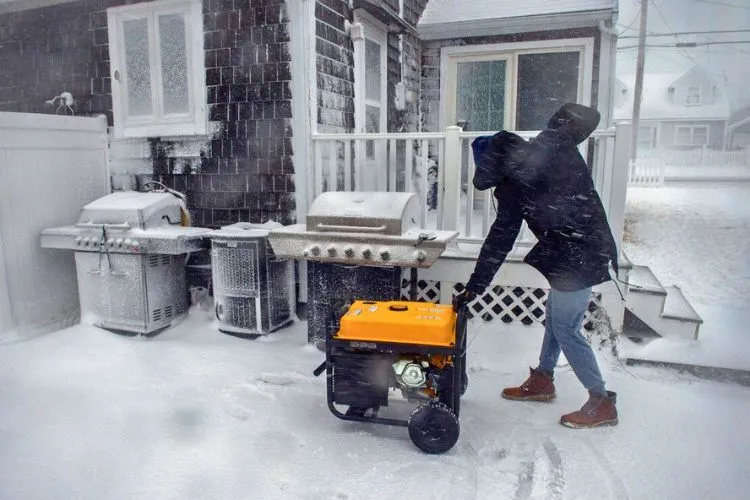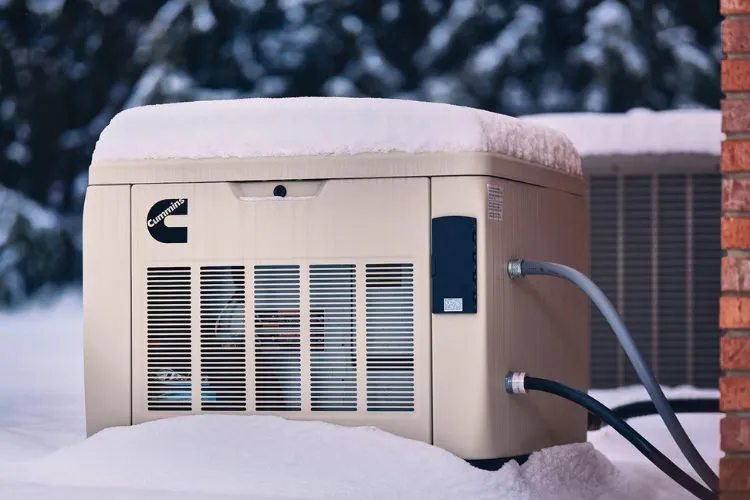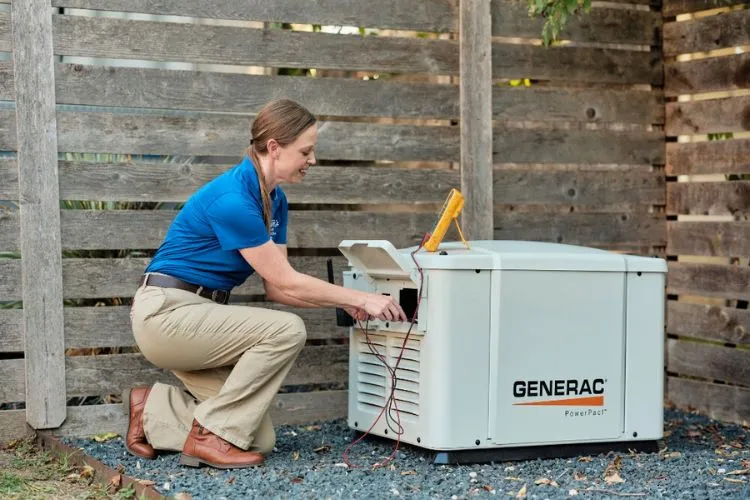As winter approaches, the reliance on generators, especially in areas prone to severe weather, significantly increases.
The drop in temperature can impact the performance of your generator.
But, how to prepare your generator for winter?
Well, preparing your generator for winter is crucial to ensure it operates efficiently, reliably, and safely during the colder months.
This guide will walk you through essential steps to prepare your generator for winter, covering maintenance checks, oil and filter changes, battery maintenance, fuel management, and storage recommendations.

Understanding the Challenges
Winter conditions pose various challenges for generator operation. Cold temperatures can lead to fuel gelling, battery failure, and difficulties starting the generator.
The efficiency of the generator can severely drop if not properly prepared, leading to potential failures when you need it the most.
How To Prepare Your Generator For Winter?
Performing a Thorough Inspection
The first step in preparing your generator for winter is to perform a thorough inspection. Check for any parts that may be susceptible to damage from cold weather.
Look for signs of wear and tear, and ensure all components are in good working order. It’s advisable to schedule a professional maintenance check to identify any issues that might not be immediately obvious.
Importance of Winter-Grade Oil
Using the right oil grade during winter is crucial for smooth engine operation. Winter-grade oil is designed to flow more easily at lower temperatures, ensuring your generator starts and runs when you need it.

Check the manufacturer’s recommendations and switch to an oil suitable for low temperatures. Regular oil and filter changes are also vital for maintaining optimal performance.
Keeping Batteries Warm
Generator batteries can lose efficiency or fail in cold weather. To prevent this, consider using battery warmers or storing the generator in a location that remains above freezing temperature.
Regularly test the battery and replace it if necessary to ensure reliable startup.
Preventing Fuel Gelling
For diesel generators, fuel gelling is a common issue in cold temperatures, which can hinder generator performance.
Using fuel additives can prevent gelling and help maintain fuel flow. Keeping the fuel tank full minimizes condensation, and choosing the right fuel type for winter can also prevent gelling.
Protection Against Elements
Generators need protection from winter elements. An enclosure or covering can offer protection but ensure proper ventilation is maintained.
The placement of your generator should provide easy access for maintenance and be in a location that minimizes exposure to snow and ice.
Generator Testing
Regular testing of your generator ensures it will perform reliably in winter conditions. Test your generator under load and in cold weather to identify any potential issues that could impact its operation when needed.
Storage Recommendations
If you plan to store your generator for the winter, choose a dry, accessible location. Use fuel stabilizer to prevent fuel degradation and disconnect the battery to extend its life.
Cold Weather Starting Tips
When temperatures drop, starting your generator can become a challenging task. To enhance cold-weather performance and ease of starting, consider these tips:
- Use Glow Plugs: For diesel generators, the installation of glow plugs can facilitate easier starts. Glow plugs warm the combustion chamber, allowing for quicker and more reliable ignition in cold weather.
- Install Block Heaters: Block heaters keep the engine warm, significantly reducing the stress of cold starts. They heat the engine and oil, improving fluidity and reducing friction, which can otherwise be problematic in low temperatures.
- Primarily the Fuel System: In colder climates, it’s essential to ensure the fuel system is primed correctly. This involves checking that the fuel line isn’t blocked by ice or gel and that the fuel filter is clean. For diesel engines, consider using winterized fuel or additives that prevent gelling and icing.
By employing these strategies, you can significantly increase your generator’s reliability and operational efficiency during the winter months, ensuring it starts smoothly even when the mercury plummets.
Insulating Your Generator
Insulating your generator can be crucial in maintaining its efficiency during cold winter months.
Proper insulation helps keep the engine warm, which facilitates smoother starts and better overall performance by preventing the internal temperature from dropping too drastically.

Benefits of Insulation
- Enhanced Efficiency: Insulation helps maintain optimal operating temperatures within the engine.
- Reduced Wear and Tear: By keeping the engine warm, insulation reduces the strain and wear caused by cold starts.
Guidance on Safe Insulation Practices
- Choose the Right Materials: Utilize materials like fiberglass insulation wraps or foam insulation that can withstand high temperatures without catching fire.
- Avoid Overheating: Ensure that the generator’s air intake and exhaust are not covered by the insulation to prevent overheating. The generator needs adequate airflow for cooling while running.
- Regular Checks: Periodically check the insulation for signs of wear or damage and ensure it remains dry and effective.
By effectively insulating your generator, you can protect it from harsh winter conditions while ensuring safe and reliable operation.
Make sure to always follow the manufacturer’s guidelines or consult with a professional when applying insulation solutions.
Frequently Asked Questions (FAQs)
How often should I start my generator during winter?
To ensure your generator stays in good condition, start and run it at least once a month.
Can I use the same oil in my generator year-round?
It’s best to switch to winter-grade oil for cold months to ensure your generator starts and runs smoothly.
What are the signs of a battery not suitable for winter use?
Difficulty starting or a battery that fails to hold a charge are signs it may not perform well in winter.
How do I know if my generator needs a winter enclosure?
If your generator is exposed to elements like snow or ice, an enclosure can help protect it.
Can I use gasoline additives in any generator model?
Check your generator’s manual to ensure compatibility with gasoline additives designed to prevent fuel degradation.
Conclusion:
Preparing your generator for winter is crucial for ensuring its reliability and efficiency during the colder months.
By following the steps outlined in this guide, you can address the common challenges posed by winter conditions.
Regular maintenance, appropriate oil and fuel management, and proper storage are key to keeping your generator ready for winter emergencies.
Take proactive steps to prepare your generator, and always seek professional advice if unsure about any procedures.
This way, you can rely on your generator to provide power when you need it most, ensuring peace of mind throughout the winter season.
